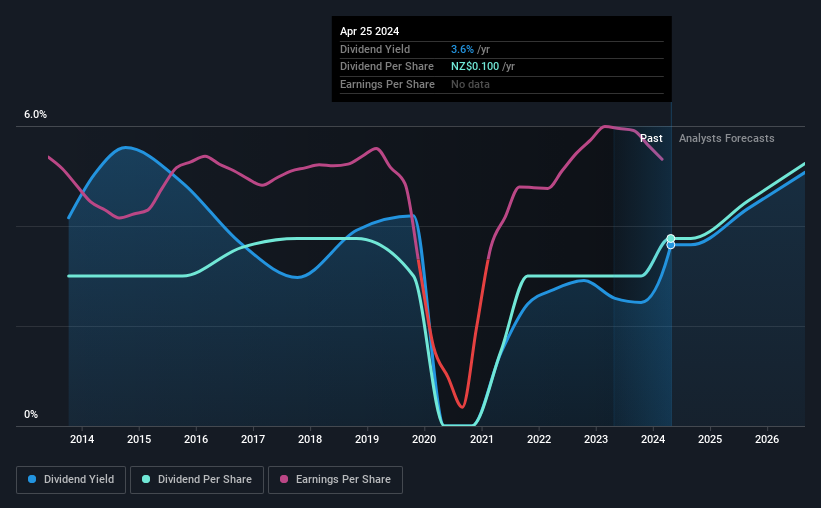Don't Race Out To Buy Scott Technology Limited (NZSE:SCT) Just Because It's Going Ex-Dividend
Scott Technology Limited (NZSE:SCT) stock is about to trade ex-dividend in four days. The ex-dividend date occurs one day before the record date which is the day on which shareholders need to be on the company's books in order to receive a dividend. The ex-dividend date is of consequence because whenever a stock is bought or sold, the trade takes at least two business day to settle. Thus, you can purchase Scott Technology's shares before the 30th of April in order to receive the dividend, which the company will pay on the 15th of May.
The company's next dividend payment will be NZ$0.0544117 per share, and in the last 12 months, the company paid a total of NZ$0.10 per share. Calculating the last year's worth of payments shows that Scott Technology has a trailing yield of 3.6% on the current share price of NZ$2.76. We love seeing companies pay a dividend, but it's also important to be sure that laying the golden eggs isn't going to kill our golden goose! So we need to investigate whether Scott Technology can afford its dividend, and if the dividend could grow.
View our latest analysis for Scott Technology
Dividends are usually paid out of company profits, so if a company pays out more than it earned then its dividend is usually at greater risk of being cut. Scott Technology paid out 60% of its earnings to investors last year, a normal payout level for most businesses. Yet cash flows are even more important than profits for assessing a dividend, so we need to see if the company generated enough cash to pay its distribution. Scott Technology paid a dividend despite reporting negative free cash flow over the last twelve months. This may be due to heavy investment in the business, but this is still suboptimal from a dividend sustainability perspective.
Click here to see the company's payout ratio, plus analyst estimates of its future dividends.
Have Earnings And Dividends Been Growing?
Stocks with flat earnings can still be attractive dividend payers, but it is important to be more conservative with your approach and demand a greater margin for safety when it comes to dividend sustainability. If business enters a downturn and the dividend is cut, the company could see its value fall precipitously. It's not encouraging to see that Scott Technology's earnings are effectively flat over the past five years. We'd take that over an earnings decline any day, but in the long run, the best dividend stocks all grow their earnings per share.
Another key way to measure a company's dividend prospects is by measuring its historical rate of dividend growth. In the past 10 years, Scott Technology has increased its dividend at approximately 2.3% a year on average.
The Bottom Line
Is Scott Technology worth buying for its dividend? Scott Technology is paying out a reasonable percentage of its income yet an uncomfortably high -19% of its cash flow as dividends. What's more, earnings have barely grown. It's not the most attractive proposition from a dividend perspective, and we'd probably give this one a miss for now.
Having said that, if you're looking at this stock without much concern for the dividend, you should still be familiar of the risks involved with Scott Technology. To that end, you should learn about the 3 warning signs we've spotted with Scott Technology (including 1 which shouldn't be ignored).
If you're in the market for strong dividend payers, we recommend checking our selection of top dividend stocks.
Have feedback on this article? Concerned about the content? Get in touch with us directly. Alternatively, email editorial-team (at) simplywallst.com.
This article by Simply Wall St is general in nature. We provide commentary based on historical data and analyst forecasts only using an unbiased methodology and our articles are not intended to be financial advice. It does not constitute a recommendation to buy or sell any stock, and does not take account of your objectives, or your financial situation. We aim to bring you long-term focused analysis driven by fundamental data. Note that our analysis may not factor in the latest price-sensitive company announcements or qualitative material. Simply Wall St has no position in any stocks mentioned.

 Yahoo Finance
Yahoo Finance 
